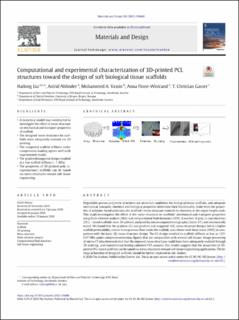| dc.contributor.author | Liu, Hailong | |
| dc.contributor.author | Ahlinder, Astrid | |
| dc.contributor.author | Yassin, Mohammed Ahmed | |
| dc.contributor.author | Finne-Wistrand, Anna | |
| dc.contributor.author | Gasser, T. | |
| dc.date.accessioned | 2021-04-27T11:40:04Z | |
| dc.date.available | 2021-04-27T11:40:04Z | |
| dc.date.created | 2020-11-02T13:18:20Z | |
| dc.date.issued | 2020 | |
| dc.Published | Materials & design. 2020, 188 1-11. | |
| dc.identifier.issn | 0264-1275 | |
| dc.identifier.uri | https://hdl.handle.net/11250/2739911 | |
| dc.description.abstract | Degradable porous polymeric structures are attractive candidates for biological tissue scaffolds, and adequate mechanical, transport, chemical and biological properties determine their functionality. Aside from the properties of polymer-based materials, the scaffold's meso-structure controls its elasticity at the organ length-scale. This study investigated the effect of the meso-structure on scaffolds' mechanical and transport properties using finite element analysis (FEA) and computational fluid dynamics (CFD). A number of poly (ε-caprolactone) (PCL) - based scaffolds were 3D printed, analyzed by microcomputed tomography (micro-CT) and mechanically tested. We found that the gradient (G) and gradient and staggered (GS) meso-structure designs led to a higher scaffold permeability, a more homogeneous flow inside the scaffold, and a lower wall shear stress (WSS) in comparison with the basic (B) meso-structure design. The GS design resulted in scaffold stiffness as low as 1.07/0.97 MPa under compression/tension, figures that are comparative with several soft tissues. Image processing of micro-CT data demonstrated that the imposed meso-structures could have been adequately realized through 3D printing, and experimental testing validated FEA analysis. Our results suggest that the properties of 3D-printed PCL-based scaffolds can be tuned via meso-structures toward soft tissue engineering applications. The biological function of designed scaffolds should be further explored in-situ studies. | en_US |
| dc.language.iso | eng | en_US |
| dc.publisher | Elsevier | en_US |
| dc.rights | Attribution-NonCommercial-NoDerivatives 4.0 Internasjonal | * |
| dc.rights.uri | http://creativecommons.org/licenses/by-nc-nd/4.0/deed.no | * |
| dc.title | Computational and experimental characterization of 3D-printed PCL structures toward the design of soft biological tissue scaffolds | en_US |
| dc.type | Journal article | en_US |
| dc.type | Peer reviewed | en_US |
| dc.description.version | publishedVersion | en_US |
| dc.rights.holder | Copyright 2020 The Authors. | en_US |
| dc.source.articlenumber | 108488 | en_US |
| cristin.ispublished | true | |
| cristin.fulltext | original | |
| cristin.qualitycode | 1 | |
| dc.identifier.doi | 10.1016/j.matdes.2020.108488 | |
| dc.identifier.cristin | 1844130 | |
| dc.source.journal | Materials & design | en_US |
| dc.source.40 | 188 | |
| dc.identifier.citation | Materials & design. 2020, 188, 108488 | en_US |
| dc.source.volume | 188 | en_US |

